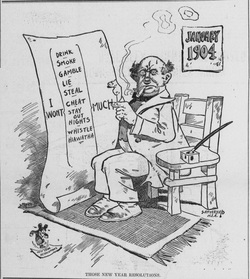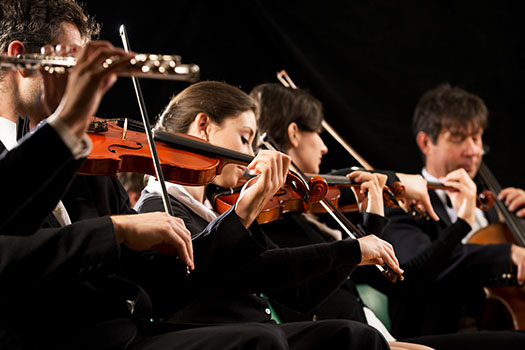It’s almost New Year. Have you found your New Year’s resolution for 2015? Would you like to introduce classical music into your life? If you have always wanted to know more about classical music but felt overwhelmed by this seemingly difficult kind of music, here is a list of things you can try to make listening to classical music more fun.

1. Just relax and use your imagination.
This applies to a lot of things, including listening to classical music. Even if you know nothing about classical music, try to let your imagination run free and just go with the flow. Some works are easier for the imagination, like Beethoven's Sixth Symphony ("Pastoral"), which depicts a storm and the peace and refreshed air after the storm. Others might be more abstract, like Bach's Art of Fugue, which does not sound like any obvious object, event, or scenery. Nevertheless, this kind of so-called absolute music can allow for even more freedom for your imagination.
2. Read about the composer's life and try to imagine his or her feelings while composing the work.
Like finding out about the author of your favorite book, reading about a composer, whose music intrigues your curiosity, can be helpful and fun. Some composers' life events can make sense of the musical works. For example, Hector Berlioz was obsessed with a famous Shakespearian actress named Harriet Smithson after seeing her on stage. Berlioz was thinking about Harriet when he wrote Symphonie fantastique, in which a man is obsessed with a woman. The woman is represented by a fixed theme (Idée fixe) first played by the clarinet, and the theme undergoes transformation as the young man becomes more and more intoxicated under the influence of opium. The continuous return of the theme really portrays the young man and Berlioz's obsession. After knowing Berlioz's personal obsession with Harriet, the creepy, intense affection in Symphonie fantastique may be more understandable to you.
However, it is important not to over-connect a composer's (or any artist's) life to his or her artworks, which might cause biography fallacy. Just because the composer got a divorce while composing a work, it does not mean the evil woman in the work represents his ex-wife.
3. Find different versions of the same work for comparison.
Critiquing how one version is better than another is not the privilege of an experienced listener. Anyone who is interested in a work can easily go online and find several different versions. Through the different interpretation of different performers or conductors, you might notice the different effects achieved. The different ways to handle a work might help you notice things you never realized. It is almost like showing a friend around in your city; sometimes it takes a different perspective to see things differently. While Leonard Bernstein's and Bruno Walter's Mahler has been embraced by many listeners, why not check out Seiji Ozawa's or Michael Tilson Thomas's?
4. Pay attention to music in movies (or books or cartoons) and find out what it is.
Music is part of culture and closely connected to other forms of culture. A lot of movies, novels, cartoons, comedies use classical music, like The Talented Mr. Ripley. If you hear classical music in a movie you like, try find the pieces by searching online. Then you can dig deeper into each piece: find out who wrote it and listen to the entire work rather than just the excerpt in the movie. It is not only fun to form your opinion on whether the movie uses the music effectively and how the meaning of the music is utilized or changed in the movie but also cool to casually mention this kind of trivial knowledge in a conversation with a friend about the movie. If you come across descriptions of musical works in a novel, try finding the piece and listening to it while reading.

By The United States Army Band (Orch Panorama2 Uploaded by AlbertHerring) [CC BY 2.0 (http://creativecommons.org/licenses/by/2.0)], via Wikimedia Commons
5. Play the what-is-the-instrument game.
Try to identify different instruments. (Take a look at the instruments in the picture above and see if you know what they are and how they sound.) If you are not familiar with any instruments, find some clips on YouTube and listen to their sounds first. Or you can listen to Sergei Prokofiev's Peter and the Wolf, in which many instruments were made into characters in a story. After you know how each of the orchestral instruments sound, you can then notice how different instruments or the combination of different instruments can create interesting effects. A piece that is good for this exercise is Maurice Ravel's Bolero, in which the same theme is passed among different instruments.
6. Pick a genre. Listen to some works of the same genre.
If you like a certain piece and want to find other similar pieces, try digging into the genre. (This reminds me of the "You may also like..." suggestions in Amazon.) For instance, if you like Johannes Brahms's Violin Concerto, you might also like Felix Mendelssohn's Violin Concerto. If you like Beethoven's symphonies, check out other symphonies from the eighteenth and nineteenth centuries. If you like Chopin's piano pieces, try Schumann or Liszt's piano works. This is a good way to broaden your repertoire and music knowledge through different genres.
7. Follow the score. Do some research. Read about the piece. Attempt to analyze the work.
If you have tried the above suggestions, you might be ready for some more serious studying and/or research. You can buy the score and follow it while listening to music; with a score, you can sometimes hear thing you have not noticed before. You can read other people's criticisms, explanations, or analyses of a work. It might take a while before you can read the music or understand music jargon, but, with some patience and time, you might find that classical music is really not all that difficult to understand and, most importantly, so rewarding to get to know better.
Are you now ready to enter the world of classical music? If you are not sure where to start, many pieces are mentioned in this article and they are among my favorite pieces. I hope you will enjoy them! Until next time--Happy New Year, my dearest readers!

By User:AmitNamdeo100 (Own work) [CC BY-SA 3.0 (http://creativecommons.org/licenses/by-sa/3.0)], via Wikimedia Commons
Ready to learn music?
Start learning with our 30-day free trial! Try our courses now!About Liberty Park Music
LPM is an online music school. We teach a variety of instruments and styles, including classical and jazz guitar, piano, drums, and music theory. We offer high-quality music lessons designed by accredited teachers from around the world. Our growing database of over 350 lessons come with many features—self-assessments, live chats, quizzes etc. Learn music with LPM, anytime, anywhere!

